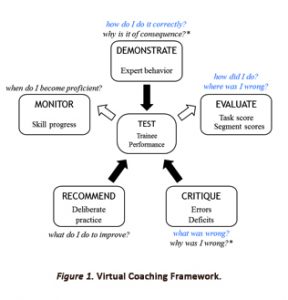 Surgery is a prototype for contexts in which human learning can be significantly transformed with technology. Besides transforming patient care, technological advances are now beginning to play an increasingly central role in graduate surgical education. Several factors are driving this transformation, including the large number of procedures in which trainees must gain competency, and learning constraints in the operating room (OR) due to patient safety concerns, variable teaching opportunities, and resource limitations. Virtual Reality (VR) simulation is an exemplar technology that enables skill acquisition in humans outside of real scenarios like the OR, but to a limited extent. We hypothesize that augmenting technology with human intelligence in a coaching paradigm will transform its role in how surgeons acquire technical skill.
Surgery is a prototype for contexts in which human learning can be significantly transformed with technology. Besides transforming patient care, technological advances are now beginning to play an increasingly central role in graduate surgical education. Several factors are driving this transformation, including the large number of procedures in which trainees must gain competency, and learning constraints in the operating room (OR) due to patient safety concerns, variable teaching opportunities, and resource limitations. Virtual Reality (VR) simulation is an exemplar technology that enables skill acquisition in humans outside of real scenarios like the OR, but to a limited extent. We hypothesize that augmenting technology with human intelligence in a coaching paradigm will transform its role in how surgeons acquire technical skill.
Surgical coaching by an experienced surgeon is effective for imparting technical skill. Lack of resources required to replicate expert coaching at scale is a critical barrier to designing effective technical skill training curricula that minimize time to OR readiness.